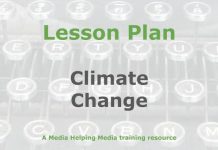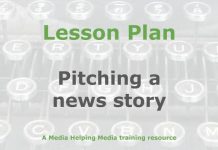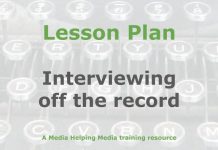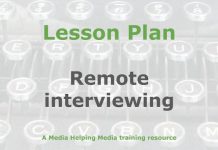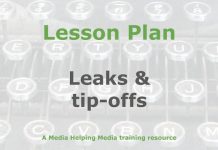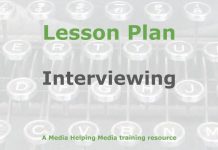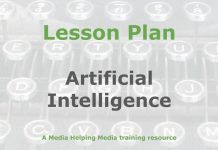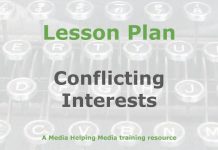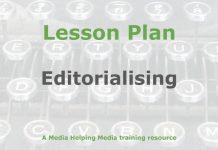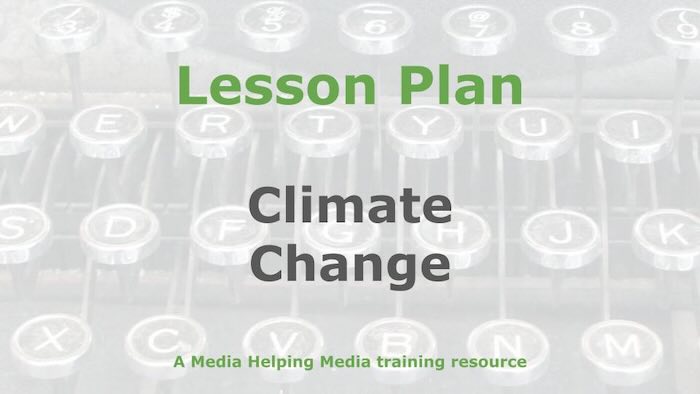 This lesson plan is designed to equip journalists with the knowledge and skills necessary to report accurately and ethically on climate change.
This lesson plan is designed to equip journalists with the knowledge and skills necessary to report accurately and ethically on climate change.
It addresses the critical issue of false equivalence and false balance, emphasising the importance of evaluating scientific consensus while also considering alternative perspectives. The lesson is based on the article ‘Covering climate change‘.
Through a combination of theoretical understanding, practical exercises, and case studies, participants will learn to navigate the complexities of climate reporting while maintaining journalistic integrity and avoiding the pitfalls of misinformation and disinformation.
The lesson is based on four articles on Media Helping Media which we recommend journalism trainers read before adapting this lesson plan below to meet local needs. The articles are:
- Covering climate change
- Human contribution to climate change
- Climate change – tone and language
- Climate change – a glossary
Session 1: The science of climate change (2 hours)
- Objectives:
- Introduce the main scientific concepts of climate change and alternative theories.
- Set out the scientific consensus on anthropogenic global warming along with alternative explanations.
- Familiarise participants with key climate data and sources.
- Content:
- Introduction to the greenhouse effect and its scientifically proven amplification by human activities.
- Analysis of key scientific studies and reports (IPCC, NASA, NOAA).
- Examination of global temperature trends, atmospheric CO2 levels, and sea-level rise data.
- Discussion on the role of climate models and their reliability.
- Activities:
- Reviewing and discussing scientific papers and data visualisations.
- Group discussion on the importance of scientific literacy in journalism.
- Providing links to the resources (above).
- Materials:
- Scientific reports and data visualisations.
- Links to relevant websites (NASA, NOAA, IPCC).
Session 2: Dangers of false equivalence and false balance (2 hours)
- Objectives:
- Define and illustrate false equivalence and false balance.
- Analyse case studies of misleading climate change reporting.
- Consider the alternative explanations.
- Develop strategies for avoiding the pitfalls of trying too hard to achieve ‘balance’.
- Content:
- Theoretical framework of false equivalence and false balance.
- Analysis of media examples that demonstrate these issues.
- Discussion on the ethical implications of misrepresenting scientific consensus.
- Discussion of the correct proportion of dissenting voices.
- Activities:
- Case study analysis of news articles and broadcasts.
- Group exercises on identifying and correcting false balance.
- Role-playing scenarios of interview situations.
- Materials:
- Examples of media coverage with false equivalence.
- Guidelines on ethical reporting.
Session 3: Climate change terminology and language (2 hours)
- Objectives:
- Familiarise participants with essential climate change terminology.
- Discuss the importance of using accurate and nuanced language.
- Practice translating complex scientific terms into accessible language.
- Content:
- Review of the provided climate change glossary.
- Discussion on the impact of language on public perception.
- Strategies for avoiding alarmism and complacency.
- Review of the importance of avoiding adverbs and adjectives.
- Activities:
- Glossary quizzes and exercises.
- Writing exercises on simplifying complex terms.
- Group discussions on the emotional impact of language.
- Materials:
- Climate change glossary.
- Examples of effective climate change communication.
Session 4: Data journalism and multimedia storytelling (2 hours)
- Objectives:
- Introduce data journalism techniques for climate reporting.
- Explore multimedia storytelling formats (videos, infographics, etc.).
- Practice creating data-driven and visually engaging content.
- Content:
- Introduction to data sources and analysis tools.
- Techniques for visualising climate data.
- Best practices for creating multimedia climate stories.
- Instruction on how to effectively use provided resources.
- Activities:
- Data analysis exercises using climate datasets.
- Creation of sample infographics and video storyboards.
- Presentations of multimedia project ideas.
- Materials:
- Climate datasets and analysis tools.
- Examples of effective multimedia climate stories.
Session 5: Ethical journalism and fact-checking (2 hours)
- Objectives:
- Reinforce ethical journalism principles in climate reporting.
- Develop fact-checking skills for identifying misinformation and disinformation.
- Discuss strategies for dealing with unconscious and intended bias.
- Content:
- Review of ethical guidelines and best practices.
- Techniques for fact-checking climate claims.
- Discussion on recognising and mitigating unconscious bias.
- Discussion on how to deal with disinformation.
- Activities:
- Fact-checking exercises using real-world examples.
- Group discussions on ethical dilemmas in climate reporting.
- Developing strategies for identifying and countering disinformation.
- Materials:
- Fact-checking resources and tools.
- Case studies of ethical breaches in climate reporting.
Session 6: Reporting on climate solutions and impacts (2 hours)
- Objectives:
- Explore strategies for reporting on climate solutions and resilience.
- Discuss the importance of humanising climate change stories.
- Develop skills for interviewing climate experts and affected communities.
- Content:
- Strategies for highlighting climate solutions and innovations.
- Techniques for telling impactful human stories.
- Guidelines for conducting ethical and respectful interviews.
- Review of the skills needed by climate journalists.
- Activities:
- Interview practice with simulated climate experts and community members.
- Group discussions on framing climate change as a collective challenge.
- Developing project proposals for climate change stories.
- Materials:
- Interview guidelines and sample questions.
- Examples of effective climate solution stories.
- The guides provided in the text.
Summary
The lesson plan covers essential aspects of climate change reporting, including understanding scientific consensus, interpreting climate data, using appropriate language, awareness of alternative theories, and the importance of avoiding false balance and equivalence. It also emphasises the importance of ethical journalism, fact-checking, and recognising bias. Participants will learn to communicate complex information effectively, highlight solutions, and frame climate change as a collective challenge. The plan includes practical exercises, such as analysing news articles, conducting interviews, and creating multimedia content, to reinforce learning and develop practical skills.
